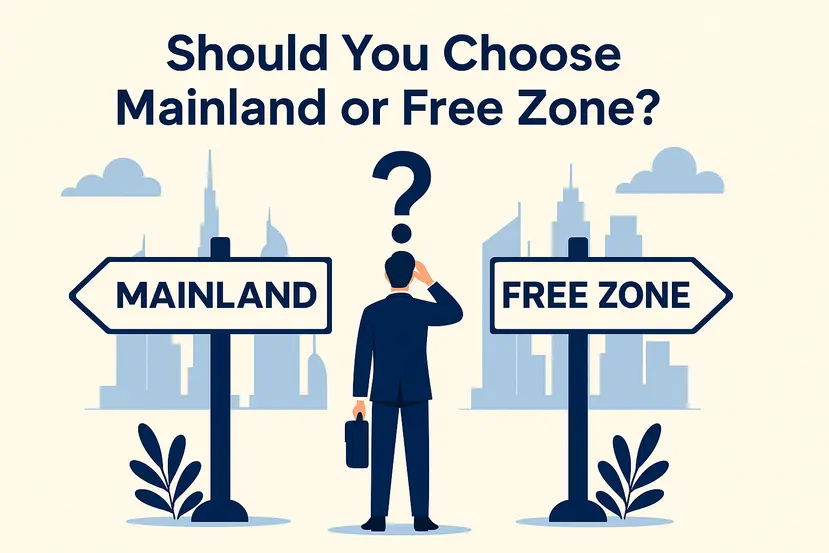Thinking about starting a business in Dubai? You’re not alone. Dubai has become one of the most attractive business hubs in the world, offering zero income tax, a strategic location, and world-class infrastructure. But before you dive in, it’s important to understand the process step-by-step to avoid costly mistakes.
This guide will walk you through how to start a business in Dubai in 2025, especially if you’re doing it for the first time.
What Are the First Steps to Start a Business in Dubai?

1. Decide on the Type of Business Activity
Dubai offers many options, from tech startups to retail, consultancy, trading, logistics, and e-commerce. The activity you choose will determine which licenses and approvals you need.
Some activities (like financial services) are regulated more strictly than others.
Tip: Don’t generalize. Be specific like “management consultancy” instead of just “consulting.”
Should You Choose Mainland or Free Zone?

2. Select the Right Jurisdiction: Mainland, Free Zone, or Offshore
- Mainland businesses can trade across the UAE and work with government contracts.
- Free Zones offer 100% foreign ownership and tax benefits but restrict trading to outside the UAE or within the same zone.
- Offshore setups are ideal for international operations without a physical UAE presence.
Quick Tip: For e-commerce or remote work, free zones like Meydan or Shams may be ideal.
What License Do You Need?
3. Choose the Appropriate Business License
There are four main types of business licenses:
- Commercial (for trading businesses)
- Professional (for services or consultancies)
- Industrial (for manufacturing/production)
- Tourism (for travel-related businesses)
Extra Note: Some activities need special external approvals (e.g., health, education, financial services).
What Documents Are Required?
4. Prepare Your Documentation
Here’s what you usually need:
- Passport copies of all shareholders
- Visa copies or entry stamps
- Passport-sized photos
- NOC (No Objection Certificate) if you’re under a UAE sponsor
- Business plan (sometimes required for specific activities)
Pro Tip: Free zones often allow setup with scanned copies, you don’t need to be in the UAE physically.
How Do You Register the Company?
5. Submit Application and Get Initial Approval
Once documents are ready:
- Apply with the chosen authority (like DED for Mainland, or RAKEZ, DMCC, etc. for Free Zones)
- Reserve your trade name
- Get initial approval
- Finalize office space (required before final license issuance)
Free Zones usually offer shared desks or virtual offices for startups. Mainland businesses need to lease a physical office.
What Are the Fees and Setup Costs?
6. Understand the Costs Involved
Costs vary depending on:
- The jurisdiction (Free Zone vs. Mainland)
- License type
- Office space (virtual desk vs. physical office)
- Visa quota and employee count
For most startups:
- Free zone packages start at AED 5,750 (startup works offers from 4,999 AED )
- Mainland setup may range from AED 12,000–25,000+
Be sure to factor in hidden costs like:
- Corporate bank account setup
- UAE national sponsorship (for some Mainland businesses)
- Annual renewals
Can You Start the Process from Outside the UAE?
7. Yes, Remote Setup Is Possible
Most free zones and some mainland authorities allow full remote processing.
That means:
- No travel required
- Online submission of documents
- E-signatures for agreements
This is especially useful for freelancers or e-commerce business owners living abroad.
How Long Does It Take to Start a Business in Dubai?
8. Average Timeline
- Free Zone: 2–5 business days
- Mainland: 5–10 business days (depending on approvals)
Some zones even offer same-day license issuance under express packages.
What Comes After Company Registration?
9. Apply for Visas and Bank Account
After your company license is ready:
- Apply for investor/partner visas
- Open a UAE corporate bank account
- Register for VAT (if annual turnover is expected to exceed AED 375,000)
Banking Tip: Choose banks that understand startup needs. Emirates NBD, RAKBank, and Mashreq are startup-friendly.
Do You Need a Business Consultant?
10. Get Expert Help if You’re New
If you’re unfamiliar with UAE laws, regulations, or processes, working with a UAE Business Setup Consultant ( like Startup Works ) can save you time and costly mistakes.
They can:
- Recommend the right jurisdiction
- Handle documentation and submissions
- Guide visa processing and banking
- Give clarity on hidden costs and compliance
Frequently Asked Questions
Q1: Can I start a business in Dubai with no physical office?
Yes, especially in Free Zones where virtual desks are allowed.
Q2: Is 100% foreign ownership allowed?
Yes, in most Free Zones and many Mainland sectors (as of 2025).
Q3: Do I need a UAE national as a sponsor?
Not always. It’s optional for most business types in Free Zones and many in the Mainland.
Q4: What is the cheapest Free Zone in Dubai?
Options like Meydan and Shams offer affordable packages starting from AED 5,750.
Q5: Can I open a business bank account remotely?
Some banks allow remote onboarding, but many still require in-person verification.
Conclusion
Setting up a business in Dubai is exciting, but only if done right. Whether you’re a first-time founder or expanding into the UAE, understanding each step can make or break your success.
Explore more: Need help choosing between Mainland and Free Zone? Talk to a business consultant who knows the terrain.


